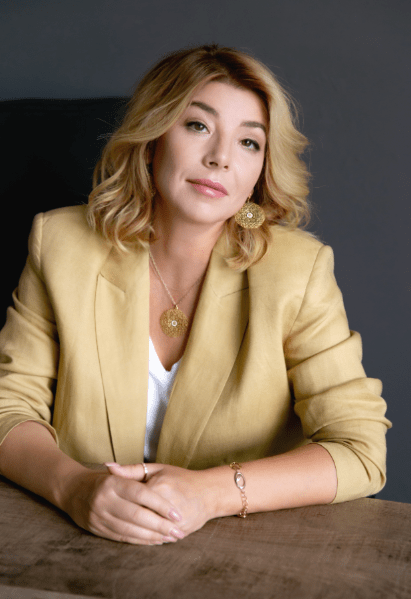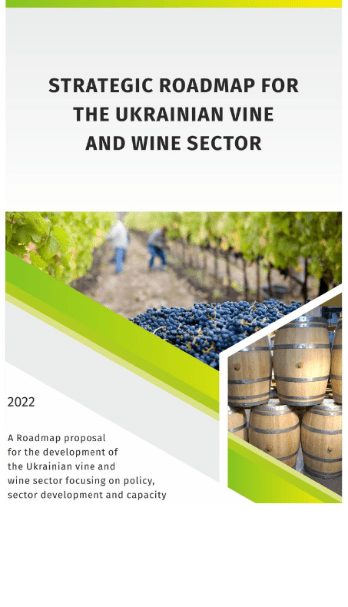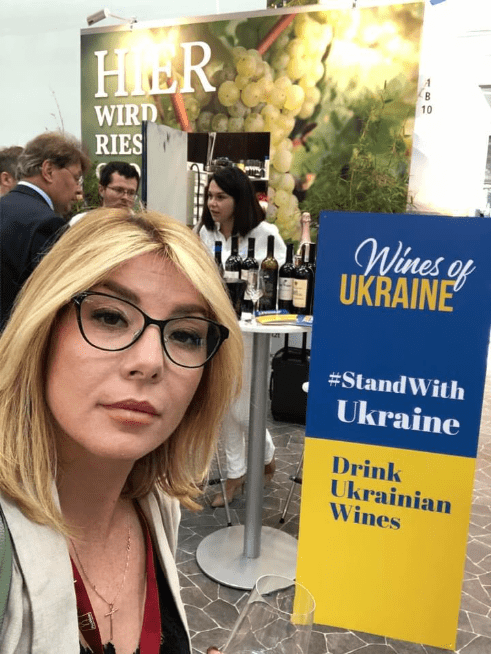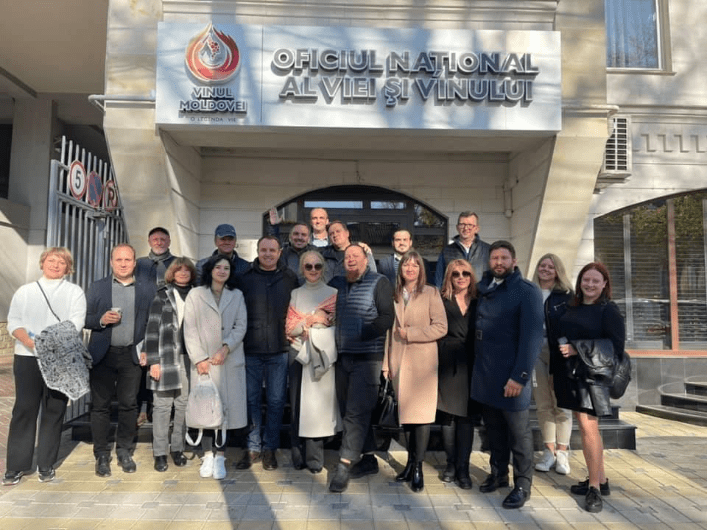
Увага! На сайті використовуються cookie файли.
The site uses cookie files
Даний сайт має вікове обмеження.
This site has age restrictions!
Я підтверджую, що мені, на жаль, давно виповнилося 18 років
The columnist D+ asked Iryna Bystrytska, international consultant of European donors projects aimed to support the wine industry in Ukraine, former Deputy Director of the National Office of Vine and Wine (ONVV) in 2018-2021, about the process of formation of Wines of Ukraine and the prospects of the Ukrainian industry, which is suffering from Russian aggression.
Iryna, your mission is very serious, so it is probably worth starting the conversation by what areas of your activity are addressed to the wine industry of Ukraine.
In May 2021, we started to work with Ukrainian small businesses in the fields of viticulture and winemaking, as this industry has experienced a significant economic decline in recent years.
We provide technical assistance to small winemakers of Ukraine in the development of an integrated approach to the development of the industry. As part of our activities, multiple trainings are held. They are dedicated to the technological features of the production of natural grape wines in accordance with international quality and safety requirements. We organize events to raise winemakers’ awareness of sustainable development, provide consulting assistance in planning a development strategy, in particular, we have developed a Roadmap for Ukrainian winemaking sector.

Please provide more details about the Roadmap.
I was lucky enough to work with international expert Marco Tiggelman (Netherlands) on its development. And finally, exactly one month before the start of the war in Ukraine, on January 25, 2022, we presented the Roadmap for the development of winemaking in Ukraine to the industry representatives. The Roadmap includes the strategy for the development of Ukrainian viticulture and winemaking, and also outlines the difficulties faced by industry enterprises. The document includes the analysis of the current market situation, consumption and export statistics, the results of research into the state of the industry in Ukraine and other countries, the structure of the main players, as well as a number of recommendations and the action plan for the period until 2030. But, of course, the events in Ukraine made adjustments to our plans.
Can you share the most important domestic consumption and export figures – both positive and negative – from this document?
Let me show you the dynamics: if in 1996 the area under vineyards was 144,000 hectares, then in 2017, only 43,000 hectares remained. Production in 2020 amounted to 5.6 million dL. At the same time, in the same year, consumption in the domestic market reached 9.5 million dL. The share of imports reached about 43% of the total consumption, i.e. – 4.1 million dL. Instead, exports amounted to 244,000 dL, which corresponds to only 4% (according to Your Total Market). That is, local production satisfies only 50% of the market’s consumer demand, moreover, it has a tendency to decrease, primarily due to the annual decrease in the area of vineyards. So, Ukraine, in principle, has a significant potential for the growth of the wine industry only at the expense of the domestic market. Even without considering export opportunities. But, of course, under the conditions of a stable increase in the quality of the produced wine – both for local consumption and for international markets.
Is it possible to compare Ukraine with any other country that has followed a similar path?
Probably, it is worth comparing with Moldova, Georgia and Armenia – countries with a similar recent history and similar needs to transition from the mass production of the Soviet period and to reorganize the industry with a focus on quality and export. At the same time, there is a key difference between Ukraine and these countries – a capacious domestic market, while the wineries of Moldova, Georgia and Armenia are extremely dependent on exports. According to the ratio of exports and domestic consumption, it is probably more appropriate to compare Ukraine with Romania, a traditional wine-producing country, where exports do not exceed 10% of production.

What are the most important recommendations you make in the Roadmap?
I would like to start by saying that the Roadmap identifies four main strategic opportunities, each of which is a separate and significant area of effort:
As for the recommendations, there are more than 20 of them in the Roadmap, they are laid out in five main sections: “Viticulture”, “Production”, “Quality and compliance with standards”, “Structure of the industry”, “Promotion and communication”. Of course, from the point of view of the management of the industry, it is difficult not to notice a rather strong lag behind neighbouring countries, outdated and confusing legislation, the lack of a clear quality control system, primarily of imported products, and most importantly, the lack of a structure directly responsible for the industry and its development. An urgent recommendation is the integration of Ukraine into the world wine market, adaptation to international standards in production and legislation, membership entry into the international wine organization OIV, creation of the national Register of Vineyards and the Wine Office responsible for the promotion and health of the industry.
Let’s proceed to Wines of Ukraine. The situation around this concept seems strange to us and we are not sure that other countries experienced the same. After all, in our country there are several associations of producers who, independently of each other, promote and use this name in their activities. There are even a couple of sites whose domain names include this concept. Please comment on the situation and give your vision: how things should really be if we are talking about a civilized wine-making community guided by the rule of law.
Yes, indeed, the number of different associations, most of which are nominal, surprised us. Many of them compete with each other and do not make any contribution to the development of the industry, but rather create incomprehensible obstacles and additional difficulties in cases where they have been rejected around the world. For example, there are no longer legally prescribed recipes for wine anywhere, but in Ukraine they exist and associations deal with their coordination with the ministry, instead of seeking their cancellation. I had to communicate with wine associations of various countries, both state and public (For example, Australian Winemakers operate without state participation). However, everyone mentioned how difficult it was at the very beginning to unite producers and even difficult to simply sit down at a common negotiating table. But, as they say, the path will be overcome by the one who walks it. And the experience of different countries will help us in this.

What measures and who should implement them so that the concept of Wines of Ukraine finally becomes a reality?
Currently, we are working on the possible structure in Ukraine that should represent this brand. Of course, it cannot belong to a single association or individual. There are many possible options, we consider the formats of offices in different countries, prescribe the functionality of this structure, which we will later discuss with the industry. God willing, we will come up with the format that will suit Ukraine. If we talk about the financing of this structure, then in the first years it can also be international donor projects. In fact, Wines of Ukraine, like the rest of Wines of …. or identical brands of countries – rather needed for promotion in foreign markets and better for countries – new players in the wine world. For example, have you heard a lot about Wines of France? But you probably know the associations of the regions of France and specific wine brands that are not interested in acting under the umbrella brand of the country, they are world famous or too strong for it. The same logic works in the domestic market, where the consumer buys a specific brand, not Wines of Ukraine. To begin with, I would advise you to brainstorm and carefully understand what the umbrella state brand is for and how it works, and then take on the ambition of owning it.

Then maybe let’s talk, at least briefly, about the principles of the state brand Wines of…? During your work in the management of the National Vine and Wine Office of Moldova, you dealt with this concept, because it has been working successfully in Moldova for a long time. What are the mandate and objectives of Wines of…? As far as we understand it, the brand relates to the scope of issues of the National Office. In general, can it belong to a state institution? What could it look like in Ukraine?
A national brand, any, in this case in the field of winemaking, must belong to the state or the industry. That is, the right holder of the brand can be the state or a structure that represents the state and the industry. For example, in Moldova, the right holder of the Wine of Moldova brand is the National Vine and Wine Office of Moldova – the structure based on private-state partnership and acting under the auspices of the Ministry of Agriculture. It is an umbrella brand under which all wineries participate in exhibitions and various events. At the same time, according to the law, all wineries pay mandatory contributions to the vine and wine fund, depending on the volume of their sales. To the funds collected from the private sector – 50%, the state adds another 50% of its own. The resulting annual budget is spent on supporting and promoting Wines of Moldova both on foreign and domestic markets, for example, on the organization of the National Wine Day. Wine of Moldova was launched 7-8 years ago, not so long ago, and the National Vine and Wine Office was founded in 2013. What it should or can be in Ukraine should be decided by the industry itself, in any case, Wines of Ukraine should represent the interests of all producers, and first of all the big ones, which will be the country’s visiting card and have a significant export volume.

How important do you think it is for emerging wine markets to have national, or if the country is lucky, international level media that would carry information to export markets about the country’s businesses and tourist destinations? Today, the world is watching what influence the mass media can have if they are supported at the state level. Are there any support programs for existing industry media?
I believe that a wine-producing country must have both professional journalists with education in the wine industry and a specialized press. This is one of the indicators of the level of wine culture in the state. For example, there are dozens of such editions in Great Britain or France, they organize international competitions and are doing well. Ukraine definitely needs media specialized in alcoholic beverages and the industry in general. Of course, today it is difficult to talk about any support from the state, but in the future, of course, industry support for the specialized media should be considered. Your editorial group has gone beyond the borders of Ukraine a long time ago, you can rather be called a regional or even international media, taking into account your long-standing presentations of Ukrainian winemakers at international expo hubs or the new Wine Travel Awards project, etc. I am expressing my sincere respect and admiration for the resilience of your team in these difficult times.

Thank you very much. Iryna, listening to you, a natural question arises: this complex field of industry management with integration into state institutions, even in the context of different countries, requires special experience, perhaps certain education or skills and knowledge. What path did you take to become an international expert of this level?
My career developed and grew in parallel with the economic development of the markets of Ukraine and Moldova. I started as a manager in large international companies, where I was responsible for a group of brands, then I worked as the head of the export development department in a company that was the leading alcohol producer in Ukraine, at that time we were the #2 vodka in the world and exported drinks to 82 countries. I was invited to work at the National Vine and Wine Office of Moldova by the project under the auspices of USAID. At first as a consultant on a number of projects, then I was offered to become a Deputy Director and, in addition to administrative activities, to directly deal with the international development of the industry and the national brand of Wine of Moldova. Hence, I got my experience and knowledge. That way turned out to be the best university.

Allow me to note that Moldova, as a wine-producing country, has really done a miracle over the years: it is not only united, not only performs brilliantly on the international arena, it (everyone understands that this is the achievement of the National Office and the people who worked on it!) managed to break the stereotype regarding the quality of Moldovan wine. So, for Ukraine, this is an example that nothing is impossible. We are sure that soon Ukraine will win and free its wine-growing regions from the invaders. What prospects await them, outlined by the Roadmap you have developed?
Despite the war and all the difficulties, we are focused on the future and are already conducting a number of programs and trainings for Ukrainian producers aimed at improving the quality of wines. These programs touch on important issues of production and sustainable development. Active consultation is currently underway with the sector and the Ministry of Agrarian Policy and Food regarding the recommendations of the Roadmap and the creation of the Wine Office, we are discussing important issues of the industry’s vitality in military and occupation conditions, as well as relationships with retail chains and how to maintain focus on national producers. We are working on the expansion of assistance to the wine industry and the involvement of various donor organizations for its support. I would not like to announce everything planned now, because we live in unstable times. But we look at the prospects of Ukrainian winemaking with great optimism, efforts are being made, so I will be happy to tell you more during our next meeting.
In view of the war that is being waged in Ukraine, what are the immediate plans of action?
For winemakers, in addition to trainings, we are planning study visits to Georgia and Armenia at the end of 2022 to exchange experience with associations of producers in different countries and to facilitate cooperation with leading scientific institutes
Thank you, Iryna, both for your work for the good of Ukraine and for the meaningful conversation!